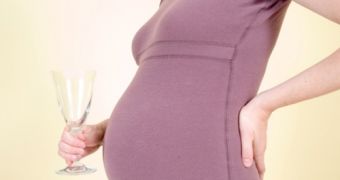The exact implications of moderate alcohol consumption during pregnancies are still up for debate, with countless studies highlighting both the pros and the cons. Nevertheless, telling women to abstain altogether equals paternalist prohibition that takes out the element of patient choice on which the current healthcare relies on, Dr. Collin Gavaghan says for the Daily Mail.
On the basis that telling pregnant women that moderate alcohol consumption is allowed could be interpreted as a “green light” for overindulgence, doctors and medical staff recommend women abstain completely for nine months. Far from being beneficial, this attitude also points out to a contradiction in the medical system, namely that it’s based on patient choice, which derives from being well informed by authorities, Gavaghan says. It is an “ethically dubious” and ultimately discriminating attitude that comes to the detriment of expectant mothers, especially since it does not fall back on accurate, clear-cut scientific facts.
“The BMA [British Medical Association] expresses concern [that] anything less than a recommendation of total abstinence risks being interpreted as a ‘green light’ for heavier drinking.” Dr. Gavaghan of the School of Law, Glasgow University, says for the aforementioned publication. “[But] if they are seen to be exaggerating risks that recent and well-publicized studies have shown to be negligible, their advice on genuine risks will carry less authority. It may be important for bodies like the Department of Health and BMA to consider whether they are in danger of ‘crying wolf’.” Gavaghan further explains.
His words seemed to be backed up by recent research, which shows that children of mothers who drank moderate amounts of alcohol during pregnancy had fewer developmental and behavioral problems that those of women who abstained completely. Nevertheless, this is not an issue of whether alcohol is good or bad for expectant mothers, as it is of informing them of both the pros and the cons, and then allowing them to make their own choice, as it’s supposed to be, the expert further says.
“The days where doctors routinely withheld information on the grounds patients would make bad decisions are, supposedly, consigned to history. It is far from clear why a paternalistic exception is permitted in the case of pregnant women. To continue preaching total abstinence because of a fear that women will misunderstand the truth, or regard a reassuring message about low-level consumption as a ‘green light’ for unrestrained overindulgence, is patronizing and paternalistic.” Gavaghan concludes by saying.

 14 DAY TRIAL //
14 DAY TRIAL //